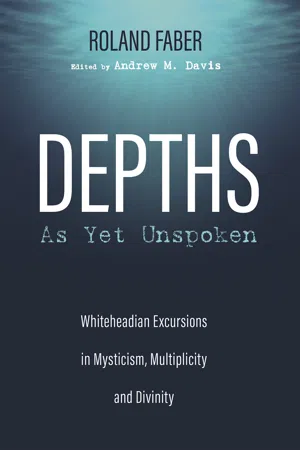
Depths As Yet Unspoken
Whiteheadian Excursions in Mysticism, Multiplicity, and Divinity
- 318 pages
- English
- ePUB (mobile friendly)
- Available on iOS & Android
Depths As Yet Unspoken
Whiteheadian Excursions in Mysticism, Multiplicity, and Divinity
About This Book
Whitehead's thought continues to attract attention in mathematics and metaphysics, but few have recognized with Roland Faber, the deeply mystical dimensions of his philosophy. "If you like to phrase it so, " Whitehead states, "philosophy is mystical. For mysticism is direct insight into depths as yet unspoken." Where, however, do these unspoken depths speak in Whitehead, and what are their associated themes in his philosophy? For the first time, Depths As Yet Unspoken gathers together Faber's most compelling writings on Whitehead's mutually immanent themes of mysticism, multiplicity, and divinity. In dialogue with a diversity of voices, from process philosophers and theologians, to mystical and poststructuralist thinkers, Faber creatively articulates Whitehead's "theopoetic" process cosmogony in its relevance to metaphysics, cosmology, everyday experience, religious pluralism, and interreligious violence, spirituality, and longstanding concerns of the theological tradition, including creation, the Trinity, revelation, religious experience, and divine mystery.Although Whitehead's mystical inclinations may not be obvious at first, they in fact constitute the apophatic backdrop to his entire philosophical corpus. Through Faber's work, Whitehead's philosophy is revealed to be nothing short of a remarkable endeavor to speak to the unfathomable depth of things.
Frequently asked questions
Information
The Mystical Whitehead
Table of contents
- Title Page
- Acknowledgments
- Abbreviations
- Editor’s Introduction: Sparks before a Theopoetic Wildfire
- Prologue: Whitehead’s Universe: Past and Future
- Chapter 1: The Mystical Whitehead
- Chapter 2: A New Mystagogy of Becoming
- Chapter 3: God’s Absence of Listening
- Chapter 4: The Touch of Reality
- Chapter 5: Bodies of the Void
- Chapter 6: Polypoetics
- Chapter 7: Divine Para-doxy
- Chapter 8: Tracing the Spirit
- Chapter 9: Theopoetic Creativity
- Chapter 10: Trinity as Event
- Chapter 11: The Process of Revelation
- Chapter 12: God in the Making
- Epilogue: (Nothing but) Mystery
- Bibliography